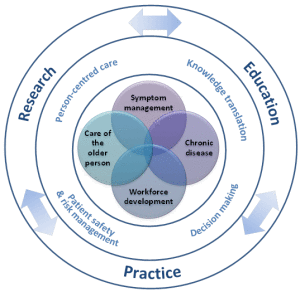Relevance of practice, research and Theory to Nursing
Introduction
Nursing is a dynamic profession that involves the care and management of individuals, families, and communities to promote health and prevent illnesses. It is a holistic approach that encompasses not only the physical well-being of patients but also their psychological, social, and spiritual needs. As nurses, it is essential to constantly evolve and adapt to the changing healthcare landscape to provide the best possible care to our patients. This is where the concepts of practice, research, and theory come into play. In this paper, we will explore and discuss the relevance of these three essential components to the nursing profession.
Practice
Practice is the application of knowledge and skills acquired through education and experience to deliver quality care to patients. In nursing, practice involves a range of activities from performing routine tasks to making critical decisions in challenging situations. The main goal of nursing practice is to improve patient outcomes and promote health and well-being. It is a continuous and ongoing process that requires nurses to stay updated with the latest evidence-based practices and adapt to changing patient needs.
Practice is relevant to nursing as it provides a platform for nurses to apply their theoretical knowledge into real-life situations. It also allows for the development of critical thinking and problem-solving skills, essential for providing quality care. Through practice, nurses can gain valuable experience and identify areas for improvement in their practice. Additionally, nursing practice also involves collaboration and coordination with other healthcare professionals, which enhances the overall quality of patient care.
Research
Research is a systematic and methodical inquiry that aims to generate new knowledge or validate existing ones. In the field of nursing, research is crucial to understanding the complex healthcare needs of patients and developing evidence-based practices to improve their outcomes. Nursing research encompasses a wide range of topics, including disease prevention, health promotion, patient care, and healthcare systems. It also involves the evaluation of nursing interventions and outcomes to improve the quality of care.
Research is relevant to nursing as it provides a scientific basis for nursing practice. It helps nurses to expand their knowledge and understanding of various health conditions, treatment modalities, and patient populations. Additionally, research also plays a vital role in identifying gaps in current healthcare practices and developing interventions to fill these gaps. It also allows nurses to stay updated with the latest advancements and practices in the healthcare field, ensuring that they provide the best possible care to their patients.
Theory
Theory provides a framework for understanding human behavior and the dynamic interplay between individuals and their environment. In nursing, theory helps to guide and inform nursing practice, research, and education. It provides a comprehensive understanding of the various aspects of patient care, such as health, illness, and healing. Nursing theories also influence the development of nursing interventions and guide the evaluation of patient outcomes.
Theories are relevant to nursing as they provide a scientific basis for nursing practice. They help nurses to understand and interpret patient needs, behaviors, and responses to different interventions, enabling them to provide individualized and holistic care. Additionally, theories also promote critical thinking and a deeper understanding of the complexities of nursing practice. They also serve as a guide for decision-making in ethical and moral dilemmas, ensuring that patient care is always the top priority.
Conclusion
In conclusion, practice, research, and theory are essential components that are relevant to nursing. These three components work together to enhance the quality of care provided by nurses. The application of theoretical knowledge into practice helps to improve patient outcomes, while research provides evidence-based practices to guide nursing interventions. Theories, on the other hand, guide nurses in understanding the complexities of patient care and decision-making. Therefore, it is crucial for nurses to keep up with the latest developments in these areas to provide the best possible care to their patients.









